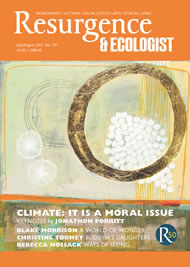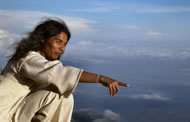Twenty-five years ago Alan Ereira’s influential BBC television film From the Heart of the World: The Elder Brother’s Warning brought global attention to the Kogi people of Colombia, a remote and ancient South American civilisation who were determined to caution us about environmental damage to the Earth. A true lost civilisation, the Kogi, who regard themselves as the guardians of the Earth, once traded with the Mayans and the Aztecs. They survived the Spanish conquests by retreating into their isolated mountain massif, the Sierra Nevada de Santa Marta.
Having remained hidden for centuries, the Kogi surfaced in Ereira’s 1990 film with a warning about how we, their “younger brother”, were destroying the ecosystem by plunder. They expected that, once informed, we would change our behaviour.
They have now realised that we do know what effect we are having, but we are too powerless and ill-informed to change without their help. The Kogi maintain that their warning was rooted in their own scientific knowledge. They concluded that they needed to convey their understanding of the processes of Nature in ways that would appear scientifically meaningful to us. They are aware of the problems – they have no writing, they are educated in a very different way from us, their language is not understood by any anthropologist, and their perception of the world is fundamentally different from ours. But they are sure that unless we can hear and learn from what they know, we are on the road to disaster.
Some 25 years after their initial message, the Kogi decided to make a cinema film, Aluna, in which they undertake an extraordinary journey along the Colombian coast, connecting all the river estuaries with 400km of gold thread. The journey begins with 70-year-old Mama Shibulata, a Kogi spiritual leader, travelling to England to collect the thread. On a visit to an observatory, Shibulata is soon discussing dark energy with the Professor of Astronomy at the California Institute of Technology, and apparently correctly identifying objects seen by the Hubble telescope.
Back in Colombia the Kogi begin laying out the thread to illustrate their understanding of the hidden connectedness in Nature. They baffle the film-maker and encounter scientific scepticism, which they see as being rooted in wilful blindness to Nature. They are driven to break away from their planned journey to demonstrate more visibly what they mean.
By the time they resume the thread-laying, they have begun to find a language Western scientists understand. They encounter leading scientific authorities, who discuss and corroborate the rational basis of the Kogis’ ancient knowledge of Nature and the universe. The repeated theme of these encounters is confirmation by Western scientists that we can learn from what the Kogi are saying. Eventually the Kogi show how the thread leads to an apocalyptic landscape, but they still retain the hope that we can learn to care for the world properly.
Filmed over three years, this ambitious feature-length documentary project initiated by the Kogi – and including footage filmed by them – is the authentic voice of an Indigenous people. The Kogi and the Tairona Heritage Trust that supports them will receive 24% of the net income of the film.
Aluna the Movie, 2012, directed by Alan Ereira, is available to watch, download and share at www.alunathemovie.com








